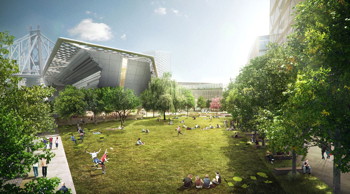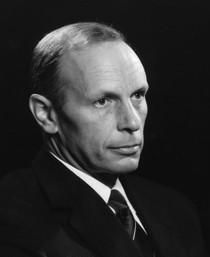NEW YORK CITY
Cornell NYC Tech begins land use review, releases new images

The central campus esplanade with large open space, a key feature of the proposed campus plan. Image by Kilograph. See larger image
Cornell NYC Tech has entered the seven-month land use review process for its new Roosevelt Island campus, slated to open in 2017. The campus is scheduled to be completed in 2037.
To mark the beginning of the process, Cornell Tech released new images of the campus in October, including preliminary renderings of its first academic building, which aspires to be a net-zero energy building that harvests as much energy as it consumes.
"Just as Cornell Tech will be pioneering new approaches to graduate research and education, our campus won't look like any other university campus that exists today," said Daniel Huttenlocher, dean of Cornell Tech. "We are determined to innovate in every aspect of the development, from the way that students, faculty, researchers, industry and the community are intermingled, to the sustainability of our buildings and their iconic architecture."
The core of the campus is the "Tech Walk" – a north-south spine that transverses the entire campus and opens onto a series of central open spaces accessible to the public. The design will capture views of the Manhattan and Queens skylines and link to the Southpoint and new Four Freedoms parks at the island's southern tip.
The site will be designed to connect outdoor and indoor spaces, highlighted by a large public café on the academic building's ground floor that spills into the open space.
The campus plan is being designed by Skidmore, Owings and Merrill, LLP, with the first academic building being designed by Pritzker Prize-winning architect Thom Mayne and Morphosis Architects.
Construction on Roosevelt Island is expected to begin in 2014, with the first phase of the campus due to open in 2017. Current plans for Phase I include the first academic building, as well as additional buildings that may include: a corporate co-location building, an executive education center with hotel facilities and a residential building for students, faculty and staff. At opening the site will also include significant public open space. When completed in 2037, the campus will include up to 2.1 million square feet housing approximately 2,000 full-time graduate students.
The campus is already operating in its temporary space donated by Google in Chelsea, and in January will begin teaching a "beta" class of computer science master of engineering students.
Cornell Tech is actively recruiting faculty while developing a new model of tech entrepreneurship. Earlier this fall, Cornell Tech announced a first-of-its-kind partnership with the U.S. Department of Commerce to bring full-time U.S. Patent and Trademark Office personnel to the campus to promote innovation and economic development.

Robert Tishman '37 See larger image
First endowed professorship honors Robert Tishman '37
The Cornell NYC Tech campus has reached another milestone: The creation of its first endowed professorship, the Robert V. Tishman Founder's Chair.
The $5 million endowment is in memory of Tishman '37, who died in 2010 at age 94. The professorship will go to a faculty member in the areas of computer science, information science, or in electrical or computer engineering.
Tishman, a major real estate developer in New York City, was founding chairman of Tishman Speyer Properties and chaired the New York Real Estate Board. Although Tishman died before the 2011 announcement of the tech campus, "the combination of a major educational facility in New York City that was engaged in the development of information technology would have been truly exciting for him," said Tishman's daughter, Lynne Handler.
The gift comes partly from $3 million in unrestricted funds from Tishman's estate; Tishman Speyer Properties contributed $2 million in Tishman's honor to create the professorship.
Tishman had a long-standing interest in technology and its use in education and research; he supported many Cornell technology initiatives and programs, many anonymously.
The goals of the tech campus – including technology commercialization across a wide range of industries, housed in an interdisciplinary setting with a focus on outreach – is a natural match with Tishman's interests, said Huttenlocher, who added that the holder of the Tishman chair will profoundly shape the new campus's initial faculty.
Information: tech.cornell.edu
